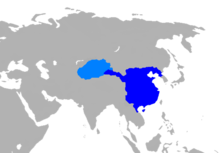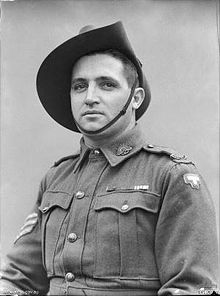Portal:History
The History Portal
History (derived from Ancient Greek ἱστορία (historía) 'inquiry; knowledge acquired by investigation') is the systematic study and documentation of the human past. History is an academic discipline which uses a narrative to describe, examine, question, and analyze past events, and investigate their patterns of cause and effect. Historians debate which narrative best explains an event, as well as the significance of different causes and effects. Historians debate the nature of history as an end in itself, and its usefulness in giving perspective on the problems of the present.
The period of events before the invention of writing systems is considered prehistory. "History" is an umbrella term comprising past events as well as the memory, discovery, collection, organization, presentation, and interpretation of these events. Historians seek knowledge of the past using historical sources such as written documents, oral accounts or traditional oral histories, art and material artifacts, and ecological markers.
Stories common to a particular culture, but not supported by external sources (such as the tales surrounding King Arthur), are usually classified as cultural heritage or legends. History differs from myth in that it is supported by verifiable evidence. However, ancient cultural influences have helped create variant interpretations of the nature of history, which have evolved over the centuries and continue to change today. The modern study of history is wide-ranging, and includes the study of specific regions and certain topical or thematic elements of historical investigation. History is taught as a part of primary and secondary education, and the academic study of history is a major discipline in universities.
Herodotus, a 5th-century BCE Greek historian, is often considered the "father of history", as one of the first historians in the Western tradition, though he has been criticized as the "father of lies". Along with his contemporary Thucydides, he helped form the foundations for the modern study of past events and societies. Their works continue to be read today, and the gap between the culture-focused Herodotus and the military-focused Thucydides remains a point of contention or approach in modern historical writing. In East Asia a state chronicle, the Spring and Autumn Annals, was reputed to date from as early as 722 BCE, though only 2nd-century BCE texts have survived. The title "father of history" has also been attributed, in their respective societies, to Sima Qian, Ibn Khaldun, and Kenneth Dike. (Full article...)
Featured picture
Did you know (auto generated)

- ... that the Morris County Park Commission in New Jersey oversees over 20,000 acres (8,100 ha) of land, including a marina, an ice skating arena, a horse stable, a historical farm, and a gristmill?
- ... that actor Oscar Isaac contributed to the creation of his character's background history in the film A Most Violent Year (2014)?
- ... that Dean Faithfull was the oldest player in NCAA Division II football history?
- ... that in 1993, the U.S. Supreme Court upheld West Virginia's largest punitive damages award in history, awarding $10 million – 526 times larger than the compensatory damages?
- ... that although Ronteza slipped and fell chasing a cow in competition, she made Arabian horse history?
- ... that the legal battle over awarding channel 9 in Orlando, Florida, the longest case in FCC history at the time, filled 55 volumes?
Neferefre Isi (fl. 25th century BC; also known as Raneferef, Ranefer and in Greek as Χέρης, Cherês) was an ancient Egyptian pharaoh of the Fifth Dynasty during the Old Kingdom period. He was most likely the eldest son of pharaoh Neferirkare Kakai and queen Khentkaus II. He was known as prince Ranefer before he ascended to the throne.
Neferefre started a pyramid for himself in the royal necropolis of Abusir called Netjeribau Raneferef, which means "The bas of Neferefre are divine". The pyramid was never finished, with a mason's inscription showing that works on the stone structure were abandoned during or shortly after the king's second year of reign. Together with the sparsity of attestations contemporaneous with his reign, this is taken by Egyptologists as evidence that Neferefre died unexpectedly after two to three years on the throne. Neferefre was nonetheless buried in his pyramid, hastily completed in the form of a mastaba by his second successor and presumably younger brother, pharaoh Nyuserre Ini. Fragments of his mummy were uncovered there, showing that he died in his early twenties. (Full article...)
On this day
- 1002 – King Æthelred II (pictured) ordered the massacre of all Danes in England.
- 1914 – Zaian War: Zaian Berber tribesmen routed French forces at the Battle of El Herri in Morocco.
- 1963 – A man wielding a dagger was subdued as he was about to attack Sanzō Nosaka, the chairman of the Japanese Communist Party.
- 1966 – Arab–Israeli conflict: In response to a Fatah landmine incident, the Israeli military conducted a large cross-border assault on the Jordanian-controlled West Bank village of Samu.
- 1974 – Ronald DeFeo Jr. killed six members of his family in Amityville, New York, events that later inspired the book The Amityville Horror and a subsequent media franchise.
- Theophilus Holmes (b. 1804)
- Anne Dallas Dudley (b. 1876)
- Arthur Nebe (b. 1894)
- Amelia Bence (b. 1914)
Selected quote
Truth alone will endure, all the rest will be swept away before the tide of time. I must continue to bear testimony to truth even if I am forsaken by all. Mine may today be a voice in the wilderness, but it will be heard when all other voices are silenced, if it is the voice of Truth.
— Gandhi, Indian political and spiritual leader
Related portals
More Did you know...
- ... that, when Ghenadie Petrescu (pictured) was ousted from his post of Metropolitan-Primate, Romania experienced protests and riots?
- ... that the British destroyer HMS Highlander escorted Convoy SC 122 through the largest convoy battle of World War II in March 1943 and was unsuccessfully attacked by U-441 and U-608?
- ... that in 1911, John Gaunt's second biplane nearly crashed because a bystander bent the aircraft's elevator before a flight?
- ... that Themistokli Gërmenji, an Albanian nationalist, received the French Croix de Guerre in November 1917, but was executed shortly thereafter by a French military court?
- ... that fish-knives inscribed with Elokeshi's name were sold after her husband decapitated her with a fish-knife following her adulterous affair with a Hindu head-priest?
- ... that the ancient Roman dancer Galeria Copiola reached the age of 104?
- ... that to escape burning at the 1393 Bal des Ardents Charles VI of France huddled under the gown of the Duchesse de Berry, while a lord leaped into a wine vat?
- ... that a junior officer on the USS Ancon refused King George VI entry to the ship's intelligence centre because no one told him the King "was a Bigot"?
Topics
Categories

History • By period • By region • By topic • By ethnic group • Historiography • Archaeology • Books • Maps • Images • Magazines • Organizations • Fictional • Museums • Pseudohistory • Stubs • Timelines • Chronology • People • Wikipedia historians
WikiProjects
![]() WikiProject History •
Ancient Near East • Australian History • Classical Greece and Rome • Dacia • Former countries • History of Canada • Chinese history • European history • Heraldry and vexillology • Indian history • Jewish history • Medieval Scotland • Mesoamerica • Military history • Middle Ages • History of Science
WikiProject History •
Ancient Near East • Australian History • Classical Greece and Rome • Dacia • Former countries • History of Canada • Chinese history • European history • Heraldry and vexillology • Indian history • Jewish history • Medieval Scotland • Mesoamerica • Military history • Middle Ages • History of Science
WikiProject Time • Days of the Year • Years
WikiProject Biography • Composers • Political figures • Saints • United States Presidents
Things you can do
 |
Here are some tasks awaiting attention:
|
Associated Wikimedia
The following Wikimedia Foundation sister projects provide more on this subject:
-
Commons
Free media repository -
Wikibooks
Free textbooks and manuals -
Wikidata
Free knowledge base -
Wikinews
Free-content news -
Wikiquote
Collection of quotations -
Wikisource
Free-content library -
Wikiversity
Free learning tools -
Wiktionary
Dictionary and thesaurus





















































